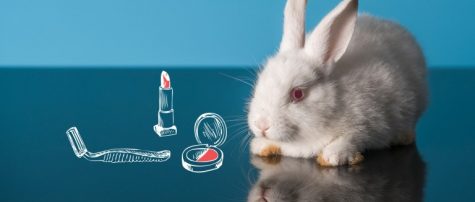Animal Cruelty in the Beauty Industry
A few years ago, one of the most popular beauty brands in the world was exposed in a scandal for the mislabelling of their cosmetics: Loreal Paris marketed themselves as a 100% vegan, cruelty-free brand despite manufacturing products in China, where animal testing is required. However, while the brand received an abundance of attention for this controversy, many other large beauty companies in the industry use animal testing as well, including Estee Lauder, Clinique, Bobbi Brown, Nars, Maybelline, Makeup Forever and Benefit. Although animal testing is not required in the US, brands implement this method in order to try out new chemicals in their releases. There are thousands of makeup ingredients that have been abundantly tested and contain large amounts of research, yet, companies deem it vital to discover alternative formulations anyways. The treatment of these animals is heartbreaking, many having chemicals rubbed on their bare skin or forced down their throats. The Humane Society predicts that over 100,000-200,000 animals die each year during cosmetic testing. This is an issue that is only going to expand in the next few decades, and without increased activism and knowledge upon this subject, animal testing will continue to harm millions of more animals
What is animal testing?
Animal testing is defined by Cruelty Free International as “any scientific experiment or test in which a live animal is forced to undergo something that is likely to cause them pain, suffering, distress or lasting harm.” Other forms of animal cruelty include the injecting or force feeding of harmful substances, the exposure of radiation, the inhalation of toxic gases or the removal of organs and tissues.
What commonly occurs in an animal test in the beauty industry?
The type of tests used in the cosmetic industry include eye and skin irritation tests, where chemicals are rubbed onto shaved skin or put inside the eyes of animals. In some extreme cases, even oral force-feeding is used. These studies commonly last for weeks or months to view signals of illnesses or health hazards, many chemicals frequently causing cancer or birth defects. One horrifying example of this is nicknamed “lethal dose” tests, in which animals are forced to swallow large amounts of a certain cosmetic ingredient in order to determine the amount needed to kill it. These can cause immense amounts of pain and torture to the animals, such as blindness, swollen eyes, internal bleeding and organ damage, birth defects, and death. Even while being killed during painful processes such as by decapitation, neck-breaking or asphyxiations, the animals never receive any sort of pain relief medication.
Why is animal testing used while making products? Is it necessary to have?
Brands use cosmetic testing on animals because they are held to a safety standard for the chemicals contained in their products. Whenever manufacturing or generating ideas for a more effective item, brands make an effort to incorporate increasingly modern technologies to differentiate their products from other competitive markets. The only issue with this, however, is that the unique or newly introduced ingredients usually have little or no research conducted upon them. In order to gain FDA approval, they have to be tested as unharmful, and the cheapest and most manageable option to display this is through animal testing
What can be done to limit animal testing?
A quote from Danbee Kim, a comparative neuroscientist at the Champalimaud Foundation suggests “how can we empathize with our animal collaborators instead of assuming they are incapable of having human-like mental experiences?” In order to limit the use of animal testing, begin by researching products that do not test on animals. PETA has released lists as well as many other websites informing consumers on whether cosmetic companies are cruelty-free or not. Other examples include using social media or speaking with others to spread awareness about this issue. The more people who are conscious about these traumatic experiences the animals have to go through, the higher the likelihood of change being made. Lastly, another option is petitioning or contacting brands themselves and telling them the concerns about animal cruelty. Many beauty companies need to acknowledge that by testing on animals, they are losing large amounts of support and popularity.
While animal testing may be believed to be a non-significant problem, it has apalling consequences on innocent animals and can leave lasting distressing experiences. Some have to inhale poisonous gases, get bones and their spinal cords crushed, or even be force-fed toxic chemicals. Since the US has no laws forcing companies to not use animal testing, makeup and beauty brands will continue to use it as an easier alternative to fixing their inhumane methods and saving innocent animals. Without more activism on this problem, hundreds of thousands of animals will be killed each year for the sake of the production of beauty products. No cosmetic or skincare item should be worth the life of an animal who has done no harm.
Hello! My name is Eileen Lincoln, and I am a junior here at Oakton! This is my third year in journalism but my first year as an Editor-in-Chief. I mainly...




CC | Apr 28, 2020 at 8:21 pm
Thank you for spreading animal awareness. I am very grateful that you have put out the facts about the atrocities innocent animals have to go through in the beauty industry. It’s heartbreaking to still see many innocent animals go through so much pain, and have their freedom and rights be completely taken from them. I am doing my sophomore project about animal abuse in the cosmetic and fashion industry, and your article will for sure be a source on my paper. Once again thank you for spreading animal awareness, this means a lot for me and the animals who have and are being affected by this inhuman industry.